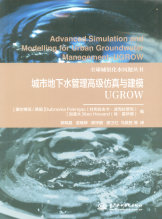
并列正书名: Advanced Simulation and Modelling for Urban Groundwater Management-UGROW
主要责任者: [塞尔维亚/英国]Dubravka Pokrajac(杜布拉夫卡·波克拉贾克),[加拿大]Ken Howard(肯·霍华德);郭晓晨,雷晓辉,穆祥鹏,廖卫红,马景胜 等
责任方式: 编;译
出版者: 中国水利水电出版社
出版地: 北京
字数: 217 千字
页码: 1-200
开本: 16
中图分类号: TU991.31
语种:中
定价:58.00
出版时间:2015-05
丛书多卷书否:是
丛书名:全球城镇化水问题丛书
书目简介:本册工具书是全球城镇化水问题丛书之一,共收录61条词条。
被引频次:1